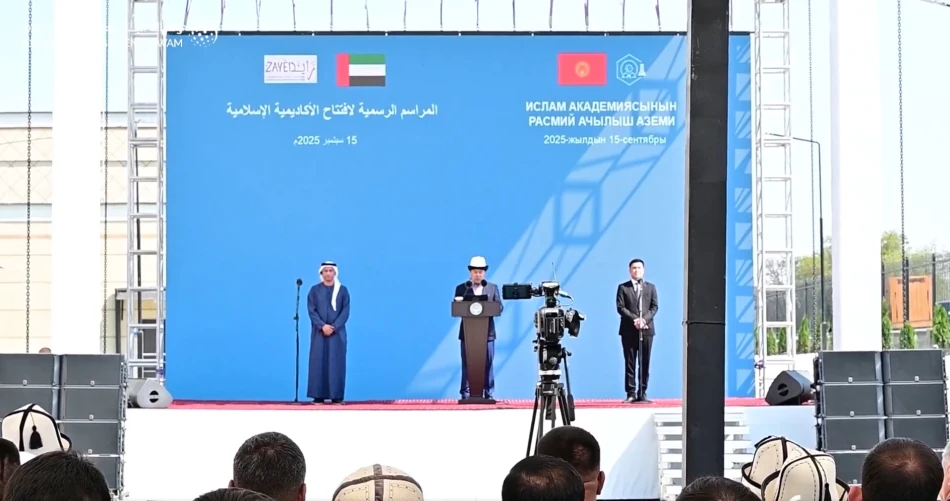
UAE Opens Islamic Academy in Kyrgyzstan on President's Directive: Expanding Islamic Education Abroad
UAE Opens $5 Million Islamic Academy in Kyrgyzstan, Strengthening Central Asian Education Ties
The United Arab Emirates has inaugurated a major Islamic academy in Kyrgyzstan's Tokmok city, marking a significant expansion of Emirati soft power influence in Central Asia. The $5 million facility, attended by Kyrgyz President Sadyr Japarov, represents the UAE's growing strategic investment in educational diplomacy across Muslim-majority nations seeking to modernize their religious education systems.
Strategic Timing in a Volatile Region
The academy's opening comes at a critical moment for Central Asia, where traditional powers like Russia and China compete with Gulf states for influence. Kyrgyzstan, one of the region's most politically unstable countries, has experienced two revolutions since 2005 and continues to grapple with economic challenges and religious extremism concerns.
By establishing this educational institution, the UAE positions itself as a moderate Islamic alternative to more conservative religious influences from Saudi Arabia or potentially radical movements that have historically found footholds in the region. The timing aligns with the UAE's broader "Year of Tolerance" initiatives and its effort to project itself as a progressive Islamic nation globally.
Educational Infrastructure as Diplomatic Currency
The academy features 10 multipurpose classrooms and offers both undergraduate and graduate programs, alongside professional training and continuing education services. Located 60 kilometers from Kyrgyzstan's capital Bishkek, the facility will provide free education to students who will later serve as teachers and imams throughout the country.
This model mirrors successful UAE educational diplomacy in other developing nations. Similar to China's Confucius Institutes or Germany's Goethe Institutes, the UAE is using educational infrastructure to build long-term cultural and political relationships. The strategy has proven effective in Africa and Southeast Asia, where Emirati-funded schools and universities have strengthened bilateral ties.
Addressing Local Needs
Kyrgyz Deputy Minister of Higher Education Qanybek Umurov emphasized the academy's role in teaching "correct" Islamic teachings to a new generation. This language suggests the facility aims to counter extremist interpretations that have occasionally surfaced in Kyrgyzstan, particularly in the volatile Ferghana Valley region.
The emphasis on producing qualified religious teachers addresses a genuine shortage in Kyrgyzstan's education system. Many rural areas lack properly trained Islamic educators, creating opportunities for unregulated religious instruction that sometimes promotes radical ideologies.
Economic and Geopolitical Implications
For investors and regional watchers, the academy represents more than educational charity. The UAE's systematic approach to building influence through education, healthcare, and infrastructure projects creates favorable conditions for future economic partnerships. Countries receiving such investments often become more receptive to Emirati business interests and foreign policy positions.
The $5 million investment, while modest by UAE standards, carries significant weight in Kyrgyzstan's economy. It demonstrates the UAE's understanding that relatively small investments in developing nations can yield disproportionate diplomatic returns.
Competing with Regional Powers
This initiative puts the UAE in direct soft-power competition with Turkey, which has also invested heavily in Central Asian education through its network of schools and universities. Unlike Turkish institutions that often emphasize secular modern education, the UAE's Islamic academy targets religious education specifically, filling a different niche in the educational landscape.
Russia and China, focused primarily on security and economic partnerships respectively, have largely neglected the religious education sector, creating an opening that Gulf states are now exploiting effectively.
Long-term Strategic Vision
The academy aligns with the UAE's broader strategy of building a network of moderate Islamic institutions worldwide. This approach serves multiple purposes: countering extremist narratives, building cultural bridges, and establishing the UAE as a leader in progressive Islamic thought.
The investment reflects the UAE leadership's recognition that educational influence often proves more durable than economic partnerships alone. By training future religious leaders and teachers, the UAE ensures its moderate Islamic interpretation will influence Kyrgyz society for generations.
As Central Asia continues to navigate between competing global powers, the UAE's educational diplomacy offers these nations an alternative partnership model—one that respects their Islamic heritage while promoting tolerance and moderation. For Kyrgyzstan, struggling with economic development and social cohesion, such partnerships provide both practical benefits and international legitimacy.
Most Viewed News

 Sara Khaled
Sara Khaled






